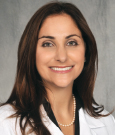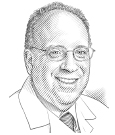The theme of the 2015 ASCO Annual Meeting, Illumination and Innovation, is especially appropriate as we consider the field of geriatric oncology. For too long, the elderly cancer patient has remained in the dark regarding treatment planning, clinical trial enrollment, and shared decision-making.
Our nation is aging; with that will come a greater number of senior adult oncology patients in need of individualized care plans and a specialized approach to treatment. The gap exists across all cancer types that affect the older patient, and, as such, every oncologist needs to be familiar with the needs of the geriatric patient.
This year’s annual meeting demonstrated ASCO’s increasing awareness of the unique needs of this population and the efforts to expose all oncologists to the critically relevant aspects of geriatric oncology. In addition to presentations devoted to geriatric oncology, sessions were designed to highlight these critical issues to enable providers and researchers to better understand and identify geriatric needs at all points on the cancer continuum. Given the projected “silver oncologic tsunami,” it is crucial that the most relevant aspects of senior adult oncology reach as wide an audience as possible.
Fitness for Surgery
Fitness for surgery in the older patient is a topic that has been covered in the literature over the past several years.1 Older patients are often not taken to elective surgery based on chronologic age alone, potentially leaving fit patients without a surgical option. Two important sessions addressed the issues of surgery in the older ovarian cancer patient and the older breast cancer patient.
Older women with ovarian cancer have a higher percentage of late-stage and aggressive disease. Although this may simply be a factor of biologic age, elderly women are less likely to be seen by a gynecologic oncologist.2 Thus, the opportunity for a clinically meaningful surgery in a nonemergent setting often is not made available to the older woman.
The question of whether or not poor prognosis is a result of age bias is an important one. Assessment of functional reserve, in addition to recognition of age, is an essential preoperative step in older women. PACE, the preoperative assessment in elderly cancer patients, uses a comprehensive geriatric assessment plus a brief fatigue inventory to assess fitness for surgery and to identify potential postoperative needs.
Chemotherapy Tolerance
Addressing a patient’s ability to tolerate chemotherapy is a vital skill for all oncologists but particularly when treating older patients, given the greater potential for adverse reactions with a narrower margin for error. An oncologist’s ability to predict toxicity to chemotherapy is frequently based on the assessment of performance status; however, this does not always capture information that might be relevant to chemotherapy tolerance.
Chemotherapy administration in the older patient with a solid tumor was addressed in several sessions at the Annual Meeting. The key message delivered is that oncologists are in need of tools to better assess elderly patients prior to chemotherapy.
A number of chemotherapy toxicity scores that can add to the oncologist’s ability to formulate an individualized treatment plan are available for use. William Tew, MD, of Memorial Sloan Kettering Cancer Center, New York, discussed the CARG (Cancer and Aging Research Group) toxicity score3 in his talk on clinical trials in the elderly. Martine Extermann, MD, of Moffitt Cancer Center, Tampa, Florida, discussed both the CARG score and the score developed by her and her colleagues: the CRASH (Chemotherapy Risk Assessment Scale for High-Age Patients) score.4 Both of these tools are available online [mycarg.org] and can help to predict potential toxicity risk from the use of chemotherapy in a patient with cancer.
‘Staging the Aging’
The perspective of the geriatrician is a key component in care of the elderly patient with cancer. Miriam Rodin, MD, PhD, geriatrician at St. Louis University, posed five key questions on “staging the aging” that are vital for all oncologists to incorporate in decision-making:
1) What is the impact of functional status on remaining life expectancy?
2) What is the impact of comorbidity on remaining life expectancy?
3) What is the likely outcome of treating this cancer?
4) Would successful treatment lead to increased overall survival, or does the risk of treatment decrease the quality of life for the remaining life expectancy?
5) How does the patient value the length vs the quality of life?
Keeping these points in the patient-provider discussion is essential when making decisions that value the patient-centered model of care. Our current models of care do not routinely take these issues into account when considering treatment. We, as providers, must begin to incorporate these questions into our conversations with senior adult oncology patients if we are going to provide patient-centered care that is meaningful to each individual patient.
‘Geriatricizing’ Clinical Trials
The future improvement of geriatric oncology–based care relies heavily on the development of clinical trials specifically for older patients with cancer as well as the enrollment of senior patients on existing clinical trials. All trials need to address questions relevant to this subset of patients, as their preferences and needs may differ markedly from those of their younger counterparts.
The role of geriatric oncology in clinical trials was addressed at the Annual Meeting by Stuart M. Lichtman, MD, FACP, FASCO. Elderly patients have often been excluded from trials, leaving few to no data for patients over the age of 80. Studies are urgently needed to study differences both within the elderly population and between the elderly and younger patients.
Innovative trial design and endpoints relevant to the geriatric population are critical issues that need to be incorporated into clinical trials going forward. There is an urgent need to expand datasets that reflect the patient population with the disease at hand—the senior adult. In short, clinical trials need to be “geriatricized” to better meet the needs of the growing elderly cancer population.
All oncologists have the potential to improve the care of the geriatric patient with cancer. This can be accomplished with better education for the growing oncologic workforce in the specific needs of the geriatric patient, as well as through team-based cancer care delivery. ASCO has recognized the value of providing excellent, individualized care to our senior adult oncology patients. The oncologic silver tsunami is spotlighting the need to bring this specialized treatment planning and care to all elderly cancer patients. ■
Disclosure: Drs. MacKenzie and Chapman reported no potential conflicts of interest.
References
1. Audisio RA, et al: Shall we operate? Preoperative assessment in elderly cancer patients (PACE) can help. Crit Rev Oncol Hematol 65:156-163, 2008.
2. Alphs HH, et al: Predictors of surgical outcome and survival among elderly women diagnosed with ovarian and primary peritoneal cancer. Gynecol Oncol 103:1048-1053, 2006.
3. Hurria A, et al: Predicting chemotherapy toxicity in older adults with cancer. J Clin Oncol 29:3457-3465, 2011.
4. Extermann M, et al: Predicting the risk of chemotherapy toxicity in older patients. Cancer 118:3377-3386, 2012.
Dr. MacKenzie is Assistant Professor and Dr. Chapman is Clinical Professor, Sidney Kimmel Cancer Center, Thomas Jefferson University, Philadelphia, Pennsylvania.
Geriatrics for the Oncologist is guest edited by Stuart M. Lichtman, MD, FACP, FASCO, and developed in collaboration with the International Society of Geriatric Oncology (SIOG). Dr. Lichtman is an Attending Physician at Memorial Sloan Kettering Cancer Center, Commack, New York, and Professor of Medicine, Weill Cornell Medical College, New York. He is also President Elect of SIOG. Visit www.siog.org for more on geriatric oncology.




